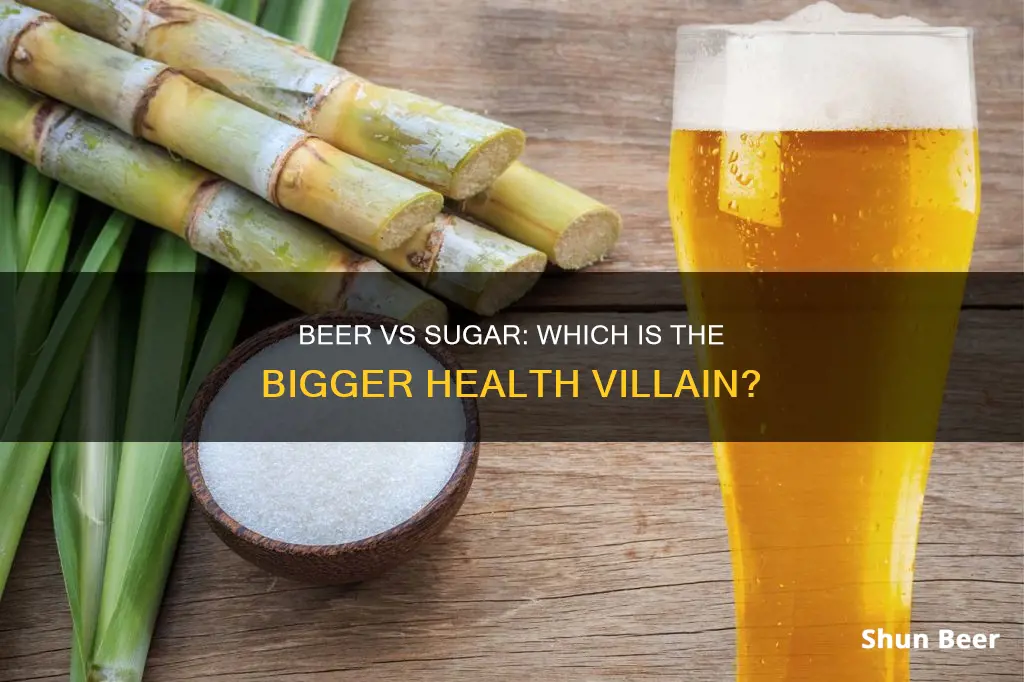
Sugar and beer are two indulgences that have been demonised in the wellness world but remain a big part of many people's favourite treats. While both can be consumed in moderation, they are not healthy substances and can contribute to weight gain. So, which is worse for you?
Sugar can be addictive and lead to major health problems, including weight gain, higher blood pressure, inflammation, diabetes, and fatty liver disease. Beer, on the other hand, is an alcoholic drink that can impair judgment and coordination, and frequent consumption can increase the risk of liver disease, stroke, and obesity. Beer also contains calories and carbohydrates, which can contribute to a feeling of fullness or bloating.
While sugar may have more far-reaching consequences due to its ubiquity, alcohol is a toxin that is difficult for the liver to metabolise. Both substances can be addictive and lead to negative side effects if abused.
So, which is worse, beer or sugar? The answer may depend on individual circumstances and consumption patterns.
| Characteristics | Values |
|---|---|
| Addiction | Sugar can be addictive and lead to major health problems. Alcohol is a toxin and is difficult for the liver to metabolize. |
| Calories | A standard 12-ounce can of beer contains approximately 100-150 calories. A standard 12-ounce can of soda contains about 39 grams of sugar, which is equal to about 9 teaspoons of sugar per can. |
| Weight Gain | Both sugar and alcohol can significantly contribute to weight gain. |
| Health Risks | Excessive alcohol consumption can lead to addiction, liver disease, and other health problems. Regularly consuming high levels of added sugar increases the health risk for higher blood pressure, inflammation, weight gain, diabetes, and fatty liver disease. |
| Satiety | Beer is considered a very filling beverage. Soda suppresses the natural process of satiety, leaving you feeling hungrier. |
| Acidity | Beer has a pH range of about 4 to 4.5, making it slightly acidic. Most sodas have a pH between 2.5 and 4, making them significantly more acidic than beer. |
| Alcohol Content | Beer contains alcohol, a psychoactive substance that can impair judgment and coordination. Soda does not naturally contain alcohol. |
What You'll Learn

Beer vs Soda: Sugar
When it comes to sugar content, beer and soda are very different. A 12-ounce can of standard soda contains about 39 grams of sugar, which is equal to about 9 teaspoons. This easily exceeds the recommended daily sugar intake for women (25 grams) and men (36 grams) set by the American Heart Association (AHA). On the other hand, a standard 12-ounce serving of regular beer contains only around 1 to 2 grams of sugar, which comes from the natural sugars found in the grains used during the brewing process.
During the fermentation process, yeast consumes much of the sugar to produce alcohol, resulting in a relatively low final sugar content in beer. Light beers may have slightly less sugar, while craft beers or specialty beers with added ingredients, such as fruit beers, might have slightly more.
While beer has significantly less sugar than soda, it is important to consider the potential health risks associated with alcohol consumption. Excessive alcohol intake can lead to addiction, liver disease, and other health problems. Additionally, alcohol can impair judgment and coordination, and contribute to weight gain. Therefore, it is crucial to consume beer in moderation and be mindful of its effects on overall health.
In summary, while beer has a lower sugar content compared to soda, it is important to consider the overall health implications of both beverages. Soda can lead to increased health risks due to its high sugar content, while beer contains alcohol, which has its own set of potential risks. As such, moderation is key when consuming either of these beverages, and they should not be considered "healthy" options.
Beer Sugar Secrets: What's the Sweetness in Your Beer?
You may want to see also

Beer vs Soda: Calories
When it comes to calories, neither beer nor soda is a healthy option. While beer contains fewer grams of sugar than soda, both drinks provide a high number of calories with virtually no nutritional value.
A 12-ounce can of standard soda contains about 39 grams of sugar, which is equal to about 9 teaspoons. The American Heart Association (AHA) recommends that women consume no more than 25 grams of sugar per day and men no more than 36 grams. This means that drinking just one can of soda exceeds the recommended daily sugar intake.
On the other hand, beer contains very little sugar, with a standard 12-ounce serving containing only 1 to 2 grams. However, beer contains more calories than soda. A 12-ounce can of beer typically contains approximately 100 to 150 calories, depending on the type and alcohol content. Light beers have lower alcohol content and fewer calories, with around 90 to 100 calories per can. Regular beers have a moderate alcohol content and usually contain 140 to 180 calories. Craft beers can vary significantly in alcohol content and flavour profiles, ranging from 150 to 250 calories per can. High-alcohol beers, such as some IPAs or stouts, may contain 200 to 350 calories or more due to their increased alcohol and malt content.
While soda may have slightly fewer calories than beer, it is important to note that these calories provide no nutritional value. The high sugar content of soda can lead to increased health risks, including higher blood pressure, inflammation, weight gain, diabetes, and fatty liver disease. These risks are further compounded when considering other sources of sugar throughout the day.
In summary, while beer contains more calories than soda, soda's high sugar content and lack of nutritional value make it a less healthy option. Beer may have a slight edge in this category, but ultimately, both drinks are high in calories and should be consumed in moderation.
Red Stripe Beer: Sugar Content and Nutritional Facts
You may want to see also

Beer vs Soda: Ingredients
Soda is a beverage that contains several ingredients that are questionable and controversial in terms of their health effects. A standard can of soda typically includes high fructose corn syrup, cane sugar, carbonated water, caramel colour, citric acid, phosphoric acid, and sodium benzoate. High fructose corn syrup is a cheap sweetener widely used in the food industry, while cane sugar is also added as a sweetener. Carbonated water provides the fizzy sensation, and caramel colour gives soda its familiar dark hue. Citric acid and phosphoric acid contribute to the tangy flavour and act as preservatives. Sodium benzoate is a chemical preservative that extends the shelf life of the product. Overall, soda contains a high amount of sugar, food colouring, and artificial ingredients, with little to no nutritional value.
On the other hand, beer is traditionally made from four primary ingredients: water, malt, hops, and yeast. Water is the main component, and its quality and mineral composition can affect the taste and character of the final product. Malt refers to germinated and dried cereal grains, predominantly barley, which provide fermentable sugars essential for brewing. Hops, the flowers of the hop plant, contribute bitterness, flavour, aroma, and act as a natural preservative. Yeast is a microorganism that ferments the sugars in the malt, producing alcohol and carbon dioxide. While beer also contains empty calories, it is made from more natural ingredients and has a lower sugar content than soda.
Some additional ingredients used in craft and commercial beers include adjuncts such as corn, rice, wheat, oats, or rye; fruits and spices for distinct flavours and aromas; sugars to enhance alcohol content; and flavoured extracts for specific flavour profiles.
While both beer and soda contain ingredients that are not particularly nutritious, beer is made from more natural and less controversial ingredients. Therefore, in terms of ingredients, beer is the better choice between the two. However, it is important to remember that excessive consumption of either beverage can have negative health consequences.
Sour Beer's Sweet Secret: Sugar Content Explored
You may want to see also

Beer vs Soda: Satisfaction and Satiety
When it comes to satisfaction and satiety, the comparison between beer and soda is complex. Both beer and soda can suppress the feeling of fullness that usually occurs after a meal, which can lead to increased snacking and additional calorie intake. However, beer drinkers often describe beer as a filling beverage due to its high carbonation and calorie content. The carbonation can create a bloating sensation, contributing to the feeling of satiety. On the other hand, soda is known to suppress the natural process of feeling full, leaving individuals feeling hungrier.
Beer contains a significant amount of calories and carbohydrates, which can enhance the sensation of fullness. However, the presence of alcohol in beer can have the opposite effect, as alcohol can increase appetite and reduce inhibitions, potentially leading to overeating. In contrast, soda is often criticised for its high calorie content with minimal nutritional value. While beer also falls into the category of empty calories, it is important to note that soda typically contains more calories per serving.
When it comes to satiety, beer and soda have different impacts on the body. Beer, due to its carbonation and calorie content, can create a feeling of fullness or bloating. However, the alcohol in beer can increase appetite, potentially leading to overconsumption of food. On the other hand, soda suppresses the feeling of fullness, leaving individuals feeling less satisfied and more prone to snacking. Therefore, while beer may provide a temporary sense of satisfaction and fullness, the presence of alcohol may counteract this effect, leading to increased food intake.
In conclusion, while beer may initially provide a greater sense of satisfaction and satiety compared to soda, the presence of alcohol can affect an individual's perception of fullness and increase their appetite. Therefore, it is important to consider the potential impact of alcohol on overall calorie intake and dietary choices when comparing beer and soda in terms of satisfaction and satiety.
Sweetening Success: Corn Sugar for Beer Brewing
You may want to see also

Beer vs Soda: Acidity
When it comes to acidity, beer is the less acidic beverage of the two. Most sodas are highly acidic due to the presence of citric, phosphorus, and other acids, which give them their fizziness. The pH scale ranges from 0 to 14, with 7 being neutral. Values below 7 indicate acidity, while values above 7 indicate alkalinity. Most sodas have a pH between 2.5 and 4, making them significantly more acidic than water, which has a pH of around 7. The high acidity of soda can have several negative effects on the body.
Firstly, the acid in soda can erode tooth enamel over time, leading to dental cavities and tooth sensitivity. Secondly, it can cause acid reflux or heartburn in some individuals. Finally, excessive consumption of acidic beverages may negatively impact bone health over time, with phosphoric acid potentially playing a role in this.
Beer, on the other hand, typically has a milder acidity. Like many carbonated drinks, beer contains carbonic acid, formed when carbon dioxide (CO2) dissolves in water. This carbonation gives beer its characteristic fizziness and contributes to its acidity. Beer may also contain other acids that occur naturally during the brewing process. For example, during the malting and mashing stages, enzymes break down starches in the malted barley into fermentable sugars, producing acidic by-products.
The pH of beer can vary depending on the style and brewing process, but most beers have a pH range of about 4 to 4.5, making them slightly acidic. The acidity of beer is generally not a significant health concern when consumed in moderation. Therefore, in terms of acidity, beer is the less harmful choice between the two beverages.
Beer's Sugar Impact: What Happens in the Body?
You may want to see also
Frequently asked questions
Both beer and sugar are unhealthy and should be consumed in moderation. Beer contains alcohol, which is a toxin and is difficult for the liver to metabolise. Sugar can also be considered a toxin when consumed in high amounts and has been linked to an increased risk of heart disease, metabolic syndrome, fatty liver disease, obesity and insulin resistance. Beer contains very little sugar, but is high in calories and carbohydrates.
Sugar is very addictive and can lead to major health problems. It has been linked to an increased risk of heart disease, metabolic syndrome, fatty liver disease, obesity and insulin resistance.
Beer contains alcohol, which is a toxin and is difficult for the liver to metabolise. Excessive alcohol consumption can lead to addiction, liver disease and other health problems. Beer is also high in calories and carbohydrates, which can contribute to weight gain.
Beer contains very little sugar, with a standard 12-ounce serving of regular beer containing around 1 to 2 grams. Light beers may have slightly less sugar content, while craft beers or specialty beers with added ingredients may have slightly more.
Both sugar and beer can contribute to weight gain. Sugar is high in calories and can lead to weight gain if consumed in large amounts. Beer is also high in calories and carbohydrates, which can contribute to weight gain.







